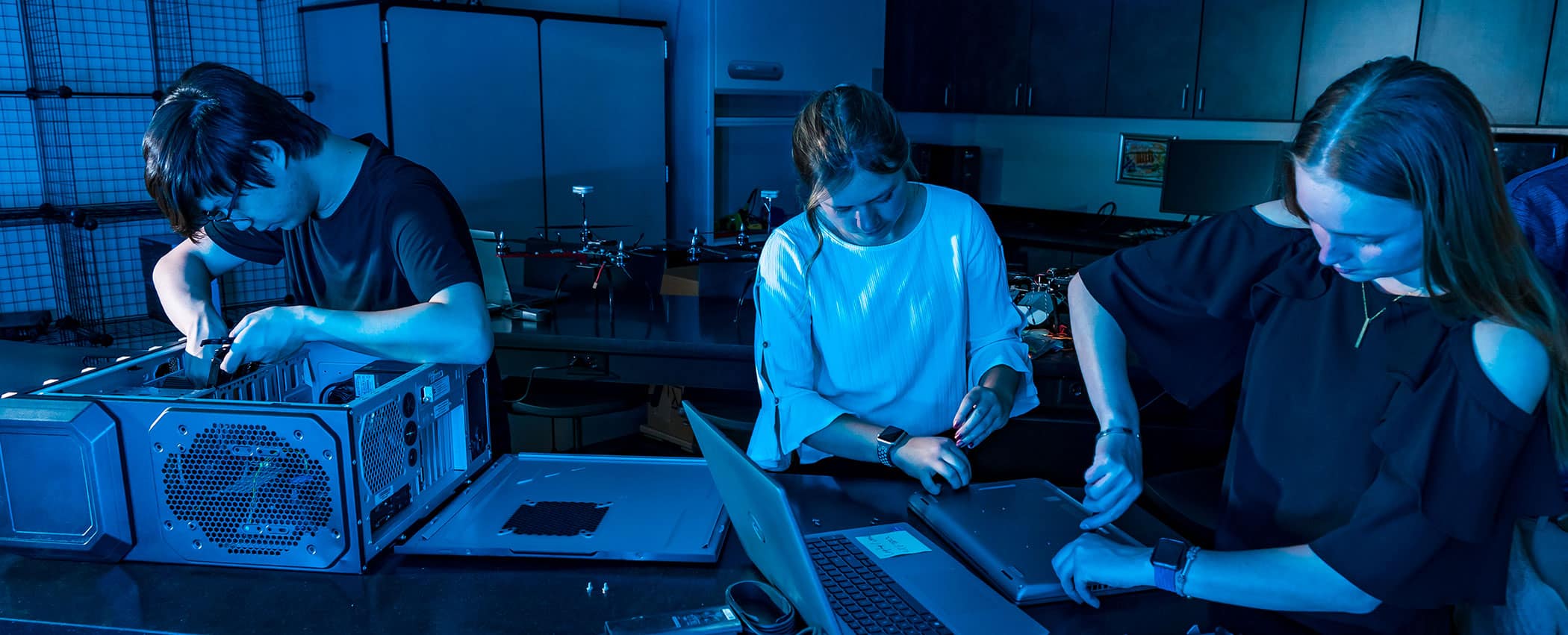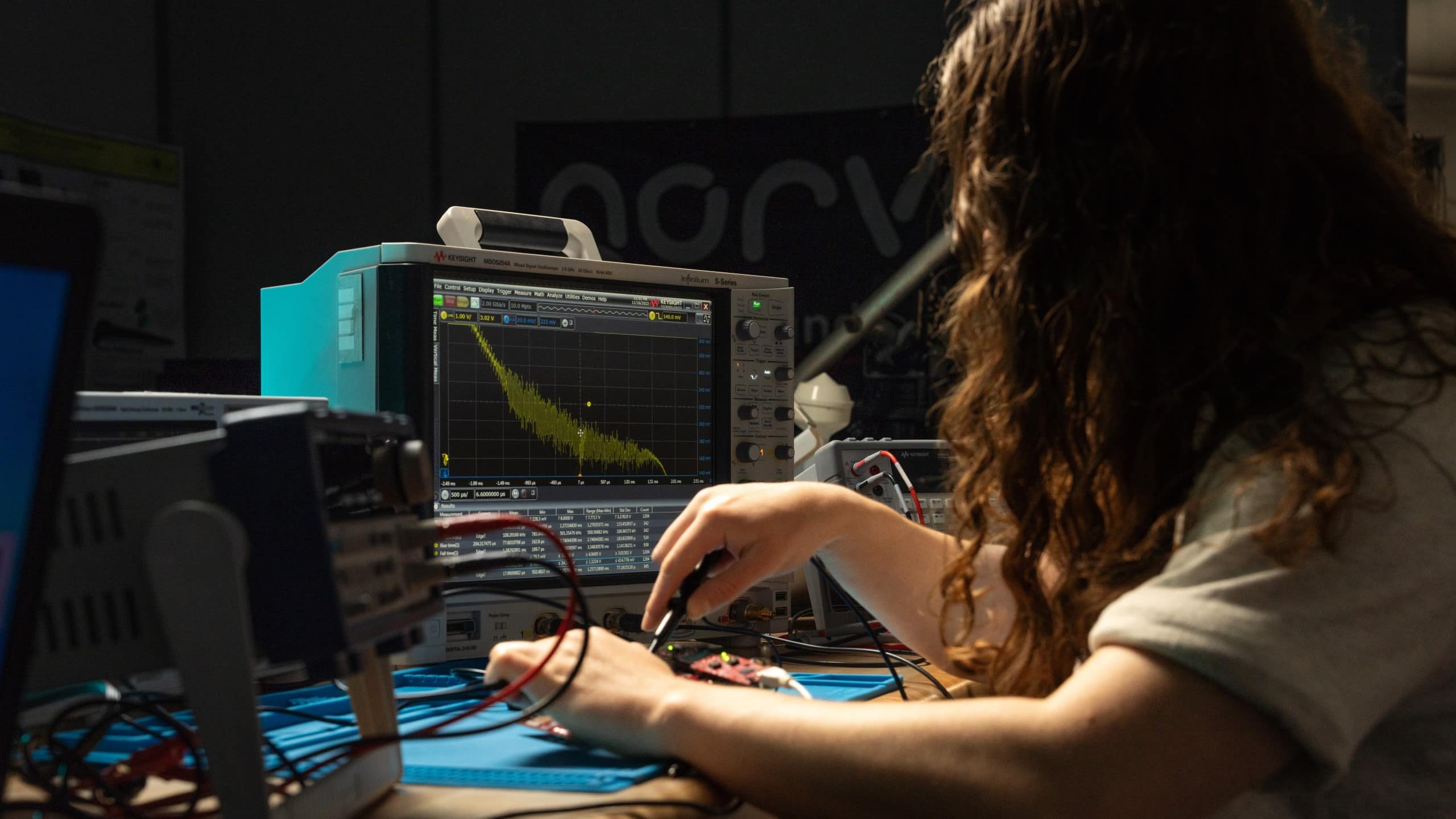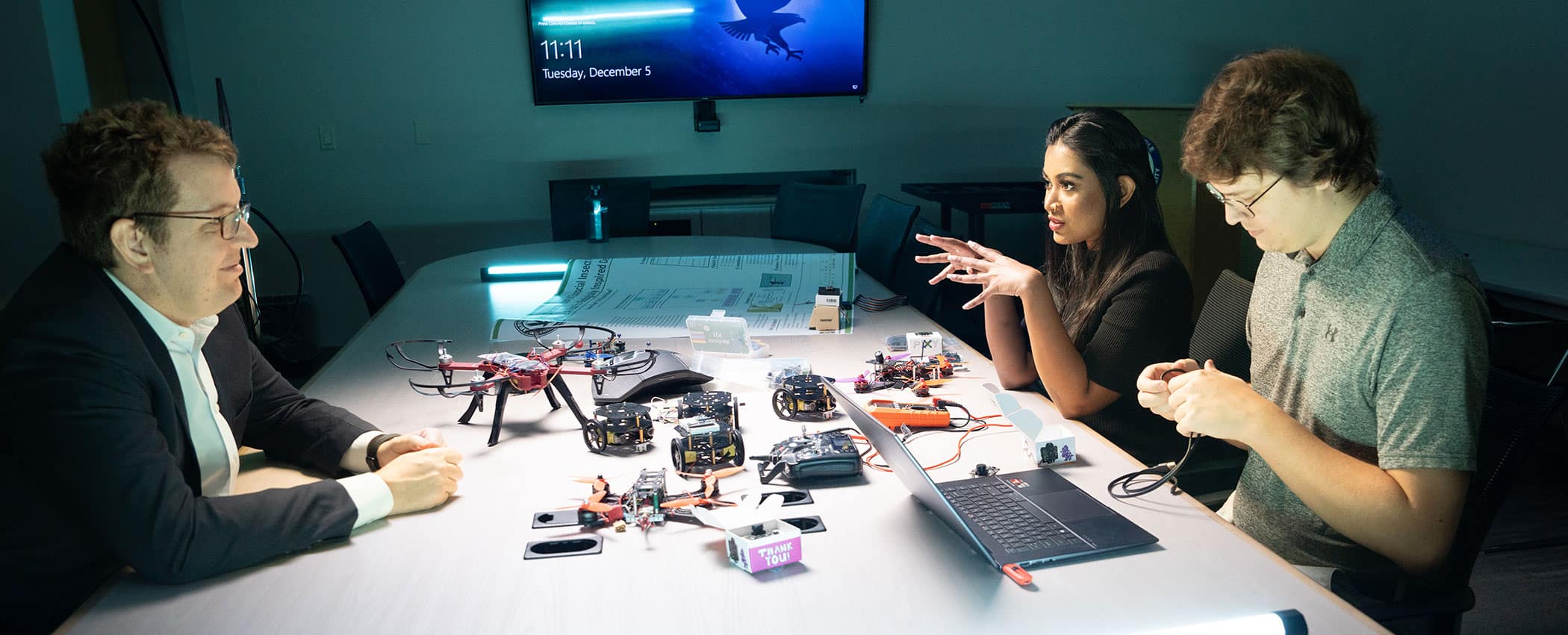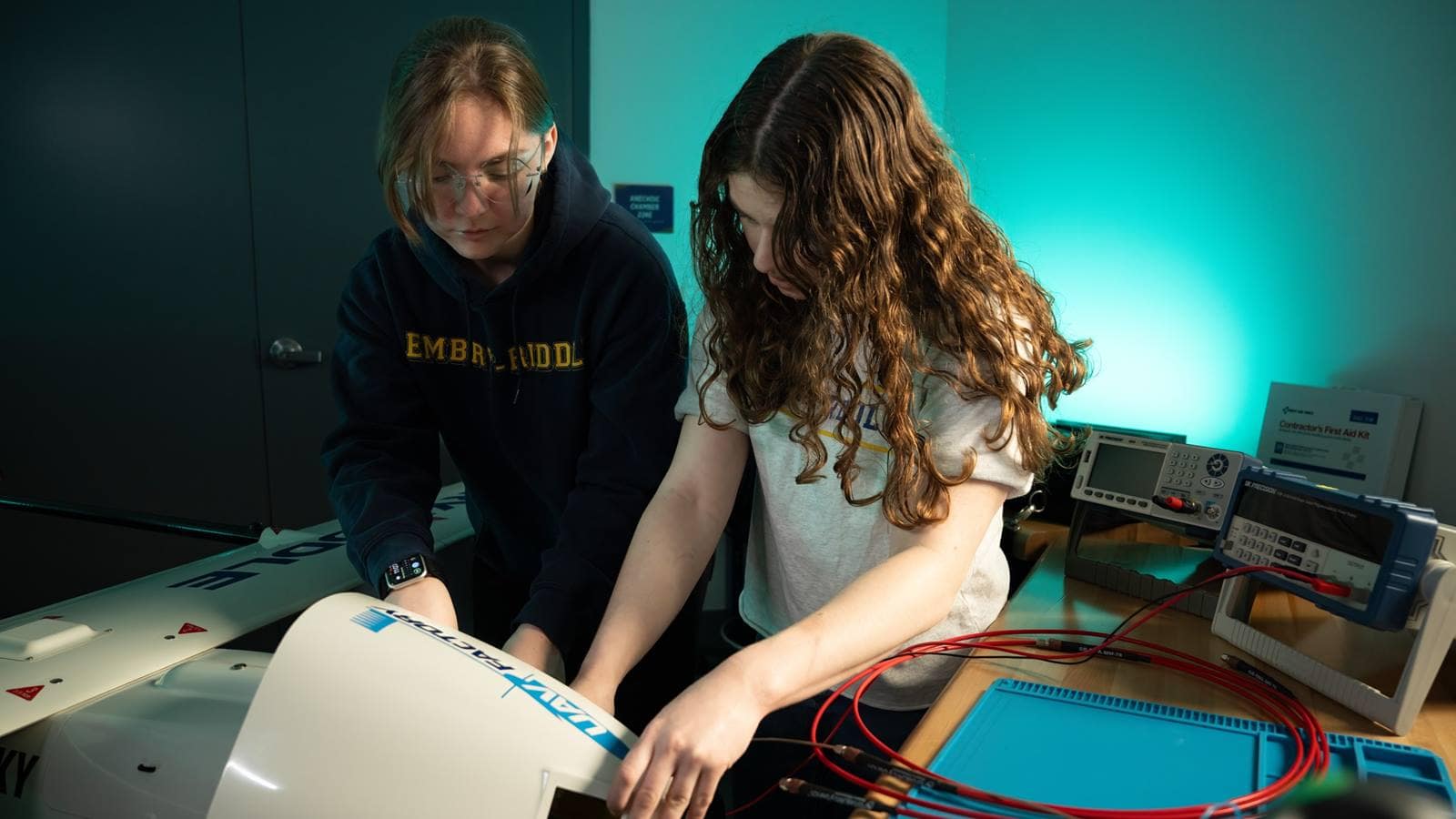
Bachelor of Science in
Software Engineering
The Bachelor of Science in Software Engineering prepares students to launch careers in industries ranging from aerospace software to video game development.
About the Bachelor of Science in Software Engineering
At Embry‑Riddle, Software Engineering graduates are prepared to enter the workplace with teamwork experience, familiarity with software architecture and design, industrial-strength documentation knowledge and the ability to perform quality assurance processes.
In the Software Engineering degree, students collaborate with multidisciplinary teams of engineers to determine a customer’s requirements for a system to design, implement, build and test the product. Students learn to document the entire process, which is essential in successfully completing the final capstone project.
While studying to be a software developer, you will have the opportunity to:
- Identify, formulate and solve complex engineering problems by applying principles of engineering, science and mathematics.
- Apply engineering design to produce solutions that meet specified needs with consideration of public health, safety and welfare, as well as global, cultural, social, environmental and economic factors.
- Communicate effectively with a range of audiences.
- Recognize ethical and professional responsibilities in engineering situations and make informed judgments, which must consider the impact of engineering solutions in global, economic, environmental and societal contexts.
- Function effectively on a team whose members provide leadership, create a collaborative and inclusive environment, establish goals, plan tasks and meet objectives.
- Develop and conduct appropriate experimentation, analyze and interpret data and use engineering judgment to draw conclusions.
Acquire and apply new knowledge as needed, using appropriate learning strategies.
Software Engineering Career Opportunities
Careers and Employers
With a high placement rate of 93.8% within a year of graduation, Embry-Riddle Software Engineering degree graduates are set to enter the workforce in various positions, including software development, software engineering, security engineering and software development engineering.
Students earning a Software Engineering degree often accept employment offers from top companies such as Northrop-Grumman, American Express, Garmin, The Boeing Company, Microsoft and Amazon.
Software Engineering Salary Information
Receiving a degree in Software Engineering from Embry-Riddle provides alumni the opportunity for competitive salaries, averaging $85,800 annually as of 2022.
DETAILS
This offering is available at the following campuses. Select a campus to learn more.
About Software Engineering at the Daytona Beach, FL Campus
Housed in the Electrical, Computer, Software and Systems Engineering Department, the Daytona Beach Campus features the Cybersecurity Engineering Lab, the Digital Systems Lab and the Real-Time Systems Lab, so students have broad opportunities for hands-on learning such as designing embedded systems for aviation/aerospace applications, and software architecture and design.
Daytona Beach students develop the knowledge, skills and ways of thinking required to design and implement systems for aerospace software. These technologies lie at the heart of everything from smartphones to the control systems of modern aircraft and spacecraft.
Software Engineering Information
- Credits: 120
- Online or In-Person: In-Person
Professional Accreditation
The Bachelor of Science in Software Engineering is accredited by the Engineering Accreditation Commission of ABET, under the commission’s General Criteria and Program Criteria for Software and Similarly Named Engineering Programs.
Details about Program Educational Outcomes, Student Learning Outcomes and Enrollment Data can be found on our Software Engineering Program Accreditation Information page.
Helpful Links
- Tour our Daytona Beach Campus
- Discover the Department’s Faculty
- Explore the Fields of Study: Engineering & Computers & Technology
- Find Related Clubs & Organizations
Student Learning Outcomes
Students will:
- Have an ability to identify, formulate, and solve complex engineering problems by applying principles of engineering, science, and mathematics.
- Have an ability to apply engineering design to produce solutions that meet specified needs with consideration of public health, safety, and welfare, as well as global, cultural, social, environmental, and economic factors.
- Have an ability to communicate effectively with a range of audiences.
- Have an ability to recognize ethical and professional responsibilities in engineering situations and make informed judgments, which must consider the impact of engineering solutions in global, economic, environmental, and societal contexts.
- Have an ability to function effectively on a team whose members together provide leadership, create a collaborative and inclusive environment, establish goals, plan tasks, and meet objectives.
- Have an ability to develop and conduct appropriate experimentation, analyze and interpret data, and use engineering judgment to draw conclusions.
- Have an ability to acquire and apply new knowledge as needed, using appropriate learning strategies.
General Education Requirements
For a full description of Embry-Riddle General Education guidelines, please see the General Education section of this catalog. These minimum requirements are applicable to all degree programs.
| Communication Theory & Skills (COM 122, COM 219, COM 221) | 9 | |
| Lower-Level Humanities | 3 | |
| Lower-Level Social Sciences | 3 | |
| Lower or Upper-Level Humanities or Social Sciences | 3 | |
| Upper-Level Humanities or Social Sciences | 3 | |
| Computer Science (CS 223) | 3 | |
| Mathematics (MA 241 & MA 242) | 8 | |
| Physical and Life Sciences 1 | 7 | |
| Total Credits | 39 | |
| Professional Preparation | ||
| EGR 101 | Introduction to Engineering | 2 |
| UNIV 101 | College Success | 1 |
| Mathematics | ||
| MA 412 | Probability and Statistics | 3 |
| Math 300/400 2 | 3 | |
| Math 300/400 or Science 200/300/400 level elective 3 | 3 | |
| Computer Engineering | ||
| CEC 220 | Digital Circuit Design | 3 |
| CEC 222 | Digital Circuit Design Laboratory | 1 |
| CEC 320 | Microprocessor Systems | 3 |
| CEC 322 | Microprocessor Systems Laboratory | 1 |
| CEC 450 | Real-Time Embedded Systems | 3 |
| CEC 470 | Computer Architecture | 3 |
| Computer Science | ||
| CS 222 | Introduction to Discrete Structures | 3 |
| CS 225 | Computer Science II | 4 |
| CS 225L | Computer Science II Laboratory | 0 |
| CS 315 | Data Structures and Analysis of Algorithms | 3 |
| CS 317 | Files and Database Systems | 3 |
| CS 332 | Organization of Programming Languages | 3 |
| CS 362 | Computing Theory | 3 |
| CS 420 | Operating Systems | 3 |
| CS 432 | Information and Computer Security | 3 |
| Software Engineering | ||
| SE 300 | Software Engineering Practices | 3 |
| SE 310 | Analysis and Design of Software Systems | 3 |
| SE 320 | Software Construction | 3 |
| SE 420 | Software Quality Assurance | 3 |
| SE 450 | Software Team Project I | 3 |
| SE 451 | Software Team Project II | 3 |
| Required Electives | ||
| Specified Electives 4 | 9 | |
| Technical Elective 5 | 3 | |
| Total Credits | 81 | |
| Total Degree Credits | 120 | |
- 1
To satisfy the 7 credit hours requirement, choose one course from the following list (3 credits):
- CHM 111, GEO 215, WX 201, PS 150, PS 227
And one lecture course from the following plus its corresponding lab (4 credits):
- BIO 120 and BIO 120L, or CHM 110 and CHM 110L, or PS 224 and PS 224L, or PS 226 and PS 226L,or PS 250 and PS 253
- 2
To be selected from an approved list of courses maintained by the Program Coordinator.
- 3
Not MA 305, or PS 226, or PS 227.
- 4
Must be approved by Program Coordinator.
- 5
CEC/CS/EE/SE/SYS Upper-Level Elective, with approval from the Program Coordinator.
Suggested Plan of Study
Students should be aware that several courses in each academic year may have prerequisites and/or corequisites. Please check the course descriptions at the back of this catalog before registering for classes to ensure requisite sequencing.
See the Common Year One outline in the Engineering Fundamentals Program Introduction. CS 223 is a required course for this degree program.
| Year One | ||
|---|---|---|
| Credits | ||
| See the Common Year One outline in the College of Engineering introduction. * | 33 | |
| Credits Subtotal | 33.0 | |
| Year Two | ||
| CEC 220 | Digital Circuit Design | 3 |
| CEC 222 | Digital Circuit Design Laboratory | 1 |
| Math 300/400 Level Elective 1 | 3 | |
| COM 219 | Speech | 3 |
| SE 300 | Software Engineering Practices | 3 |
| HU/SS Lower- or Upper-Level Elective | 3 | |
| CEC 320 | Microprocessor Systems | 3 |
| CEC 322 | Microprocessor Systems Laboratory | 1 |
| COM 221 | Technical Report Writing | 3 |
| MA 412 | Probability and Statistics | 3 |
| PS Elective 2 | 3 | |
| PS Laboratory 2 | 1 | |
| Credits Subtotal | 30.0 | |
| Year Three | ||
| CEC 470 | Computer Architecture | 3 |
| CS 332 | Organization of Programming Languages | 3 |
| CS 315 | Data Structures and Analysis of Algorithms | 3 |
| SE 320 | Software Construction | 3 |
| CS 420 | Operating Systems | 3 |
| CS 362 | Computing Theory | 3 |
| Specified Elective 3 | 3 | |
| CS 317 | Files and Database Systems | 3 |
| SE 310 | Analysis and Design of Software Systems | 3 |
| HU/SS Upper-Level Elective | 3 | |
| Credits Subtotal | 30.0 | |
| Year Four | ||
| Technical Elective 4 | 3 | |
| Specified Electives 3 | 6 | |
| Math 300/400 or Science 200/300/400 Level Elective 5 | 3 | |
| SE 450 | Software Team Project I (2 credits lecture, 1 credit lab) | 3 |
| CS 432 | Information and Computer Security | 3 |
| CEC 450 | Real-Time Embedded Systems | 3 |
| SE 451 | Software Team Project II (1 credit lecture, 2 credits lab) | 3 |
| SE 420 | Software Quality Assurance | 3 |
| Credits Subtotal | 27.0 | |
| Credits Total: | 120.0 | |
- 1
To be selected from an approved list of courses maintained by the Program Coordinator.
- 2
To satisfy the 7 credit hours requirement, choose one course from the following list (3 credits):
- CHM 111, GEO 215, WX 201, PS 150, PS 227
And one lecture course from the following plus its corresponding lab (4 credits):
- BIO 120 and BIO 120L, or CHM 110 and CHM 110L, or PS 224 and PS 224L, or PS 226 and PS 226L,or PS 250 and PS 253
- 3
Must be approved by Program Coordinator.
- 4
CEC/CS/EE/SE/SYS Upper-Level Elective, with approval from the Program Coordinator.
- 5
Not MA 305, or PS 226, or PS 227.
Get Started Now:
Summary
127 Credits
Estimate your tuition by using the Tuition Calculator
View Financial Aid Information
Learn about our General Education
Find out about transferring credits to this degree
Learn more about our Veterans & Military benefits
View our Academic Calendar

Spotlight
About Software Engineering at the Prescott, AZ Campus
The Bachelor of Science in Software Engineering prepares students for software developer positions in industries ranging from aerospace software to video game development. With real-world, hands-on projects like flight control for autonomous aircraft or power line collision avoidance using computer vision, this program gives students a chance to create, test and evaluate software applications and systems.
The Software Engineering degree features an optional focus on cyber-security. Students who select this focus will be prepared to support government and industry needs for professionals skilled in software development, as well as cyber-security.
Software Engineering Information
- Credits: 126
- Online or In-Person: In-Person
Professional Accreditation
The Software Engineering program is accredited by the Engineering Accreditation Commission of ABET, www.abet.org, under the General Criteria and the Software Engineering Program Criteria.
Helpful Links
- Tour our Prescott Campus
- Discover the Department's Faculty
- Explore the Fields of Study: Engineering & Computers & Technology
- Find Related Clubs & Organizations
Student Learning Outcomes
Students will:
- Have an ability to to identify, formulate, and solve complex engineering problems by applying principles of engineering, science, and mathematics.
- Have an ability to apply engineering design to produce solutions that meet specified needs with consideration of public health, safety, and welfare, as well as global, cultural, social, environmental, and economic factors.
- Have an ability to communicate effectively with a range of audiences.
- Have an ability to recognize ethical and professional responsibilities in engineering situations and make informed judgments, which must consider the impact of engineering solutions in global, economic, environmental, and societal contexts.
- Have an ability to function effectively on a team whose members together provide leadership, create a collaborative and inclusive environment, establish goals, plan tasks, and meet objectives.
- Have an ability to develop and conduct appropriate experimentation, analyze and interpret data, and use engineering judgment to draw conclusions.
- Have an ability to acquire and apply new knowledge as needed, using appropriate learning strategies.
Degree Requirements
The Bachelor of Science degree can be earned in eight semesters, assuming appropriate background and full-time enrollment. Successful completion of a minimum of 126 credit hours is required.
Students should be aware that several courses in each academic year may have prerequisites and/or corequisites. Check the course description section of this catalog before registering for classes to ensure requisite sequencing. The B.S. degree requires that students have a minimum cumulative grade point average of 2.00 in all CEC, EE, SE, CS, and EGR courses that fulfill any degree requirement.
The Software Engineering degree includes a Space Option in which, AE 427 and AE 445 will be taken instead of SE 450 and SE 451, and EP 394 is taken as one of the technical electives.
Software engineering majors are required to have a grade of C or better in all prerequisite courses for courses with the CS, CEC, EE, EGR, ES, or SE prefixes.
Cyber-Security Focus
The degree features an optional focus on cyber-security. Students who select this focus will be prepared to support government and industry’s need for people skilled in software development as well as in cyber-security.
For the cyber-security focus, the technical elective is replaced with CS 304 Introduction to Computer Forensics (3) and the two open electives are replaced with CI 450 Computer Forensics (3) and CS 303 Network Security (3).
Program Requirements
General Education
Embry-Riddle degree programs require students to complete a minimum of 36 hours of General Education coursework. For a full description of Embry-Riddle General Education guidelines, please see the General Education section of this catalog.
Students may choose other classes outside of their requirements, but doing so can result in the student having to complete more than the degree's 126 credit hours. This will result in additional time and cost to the student.
| Communication Theory and Skills | 9 | |
| Computer Science/Information Technology | 3 | |
| Mathematics | 6 | |
| Physical and Life Sciences (Natural Sciences) | 6 | |
| Humanities and Social Sciences | 12 | |
3 hours of lower-level Humanities | ||
3 hours of lower-level Social Science | ||
3 hours of lower-level or upper-level Humanities or Social Science | ||
3 hours of upper-level Humanities or Social Science | ||
| Total Credits | 36 | |
Software Engineering Core (117 Credits)
The following course of study outlines the quickest and most cost-efficient route for students to earn their B.S. in Software Engineering. Students are encouraged to follow the course of study to ensure they complete all program required courses and their prerequisites within four years.
Courses in the core with a # will satisfy your general education requirements.
| CEC 220 | Digital Circuit Design | 3 |
| CEC 222 | Digital Circuit Design Laboratory | 1 |
| CEC 320 | Microprocessor Systems | 3 |
| CEC 322 | Microprocessor Systems Laboratory | 1 |
| CEC 450 | Real-Time Embedded Systems | 3 |
| CEC 470 | Computer Architecture | 3 |
| COM 122 | English Composition # | 3 |
| COM 219 | Speech # | 3 |
| COM 221 | Technical Report Writing (Must earn a C or better to pass COM 221) | 3 |
| CS 118 | Fundamentals of Computer Programming # | 3 |
| or EGR 115 | Introduction to Computing for Engineers | |
| CS 125 | Computer Science I | 4 |
| CS 225 | Computer Science II | 4 |
| CS 315 | Data Structures and Analysis of Algorithms | 3 |
| CS 317 | Files and Database Systems | 3 |
| CS 332 | Organization of Programming Languages | 3 |
| CS 415 | Human-Computer Interfaces | 3 |
| CS 420 | Operating Systems | 3 |
| CS 425 | Net-Centric Computing | 3 |
| CS 432 | Information and Computer Security | 3 |
| EC 225 | Engineering Economics # | 3 |
| EGR 101 | Introduction to Engineering | 2 |
| General Education - lower-level or upper-level Humanities or Social Science # | 3 | |
| General Education - lower-level Humanities | 3 | |
| HU 330 | Values and Ethics # | 3 |
| or HU 335 | Technology and Modern Civilization | |
| MA 225 | Introduction to Discrete Structures | 3 |
| MA 241 | Calculus and Analytical Geometry I # | 4 |
| MA 242 | Calculus and Analytical Geometry II # | 4 |
| MA 243 | Calculus and Analytical Geometry III | 4 |
| MA 345 | Differential Equations and Matrix Methods | 4 |
| MA 412 | Probability and Statistics | 3 |
| PS 161 | Physics I & II for Engineers # | 4 |
| PS 250 | Physics for Engineers III # | 3 |
| PS 253 | Physics Laboratory for Engineers # | 1 |
| SE 300 | Software Engineering Practices | 3 |
| SE 310 | Analysis and Design of Software Systems | 3 |
| SE 320 | Software Construction | 3 |
| SE 420 | Software Quality Assurance | 3 |
| SE 450 | Software Team Project I | 3 |
| SE 451 | Software Team Project II | 3 |
Technical Elective (3 Credits)
| Technical Electives | 3 | |
| Technical electives include EGR 200, EGR 201, SIS 365, and any AE, CEC, CEXX (Coop/Internship), CS, EE, EP, ES, MA, ME, PS, SE, or SYS course 300 level or above. Other courses may be approved by the CESE Department Chair. | ||
| ROTC Exceptions must be approved by the CESE Department Chair. | ||
Open Electives (6 Credits)
| Open Electives | 6 | |
| Total Credits | 126 | |
- #
General Education Course
UNIV 101 is taken in excess of degree requirements or meets open elective credit.
All Army ROTC students are required to complete SS 321 - U.S. Military History 1900-Present (3 credits) in order to commission.
Suggested Plan of Study
| Freshman Year | ||
|---|---|---|
| Fall | Credits | |
| CEC 220 | Digital Circuit Design | 3 |
| CEC 222 | Digital Circuit Design Laboratory | 1 |
| COM 122 | English Composition | 3 |
| CS 118 | Fundamentals of Computer Programming | 3 |
or EGR 115
|
Introduction to Computing for Engineers | |
| EGR 101 | Introduction to Engineering | 2 |
| MA 241 | Calculus and Analytical Geometry I | 4 |
| UNIV 101 | College Success | (1) |
| Credits Subtotal | 16.0 | |
| Spring | ||
| COM 219 | Speech | 3 |
| CS 125 | Computer Science I | 4 |
| MA 242 | Calculus and Analytical Geometry II | 4 |
| PS 161 | Physics I & II for Engineers | 4 |
| Credits Subtotal | 15.0 | |
| Sophomore Year | ||
| Fall | ||
| COM 221 | Technical Report Writing (Must earn a C or better to pass COM 221) | 3 |
| CS 225 | Computer Science II | 4 |
| CS 315 | Data Structures and Analysis of Algorithms | 3 |
| Humanities Lower-Level Elective | 3 | |
| MA 225 | Introduction to Discrete Structures | 3 |
| Credits Subtotal | 16.0 | |
| Spring | ||
| HU 330 | Values and Ethics | 3 |
or HU 335
|
Technology and Modern Civilization | |
| Humanities or Social Science Lower-Level or Upper-Level Elective | 3 | |
| MA 243 | Calculus and Analytical Geometry III | 4 |
| PS 250 | Physics for Engineers III | 3 |
| PS 253 | Physics Laboratory for Engineers | 1 |
| SE 300 | Software Engineering Practices | 3 |
| Credits Subtotal | 17.0 | |
| Junior Year | ||
| Fall | ||
| CEC 320 | Microprocessor Systems | 3 |
| CEC 322 | Microprocessor Systems Laboratory | 1 |
| CS 317 | Files and Database Systems | 3 |
| CS 420 | Operating Systems | 3 |
| MA 412 | Probability and Statistics | 3 |
| Technical Elective | 3 | |
| Credits Subtotal | 16.0 | |
| Spring | ||
| CEC 470 | Computer Architecture | 3 |
| MA 345 | Differential Equations and Matrix Methods | 4 |
| SE 320 | Software Construction | 3 |
| SE 420 | Software Quality Assurance | 3 |
| SE 310 | Analysis and Design of Software Systems | 3 |
| Credits Subtotal | 16.0 | |
| Senior Year | ||
| Fall | ||
| CEC 450 | Real-Time Embedded Systems | 3 |
| CS 415 | Human-Computer Interfaces | 3 |
| EC 225 | Engineering Economics | 3 |
| Open Elective | 3 | |
| SE 450 | Software Team Project I | 3 |
| Credits Subtotal | 15.0 | |
| Spring | ||
| CS 332 | Organization of Programming Languages | 3 |
| CS 425 | Net-Centric Computing | 3 |
| CS 432 | Information and Computer Security | 3 |
| Open Elective | 3 | |
| SE 451 | Software Team Project II | 3 |
| Credits Subtotal | 15.0 | |
| Credits Total: | 126.0 | |
Get Started Now:
Summary
126 Credits
Estimate your tuition by using the Tuition Calculator
View Financial Aid Information
Learn about our General Education
Find out about transferring credits to this degree
Learn more about our Veterans & Military benefits
View our Academic Calendar
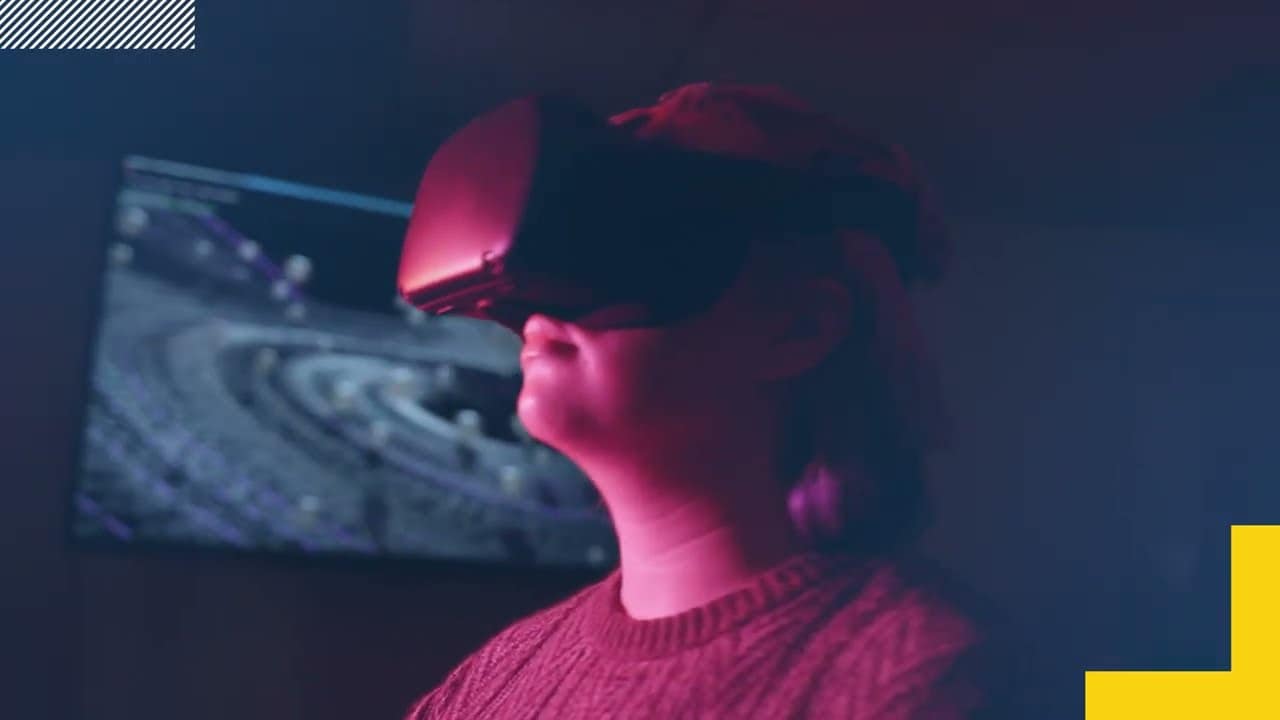
Spotlight
About Software Engineering at the Worldwide & Online Campus
As technology becomes more and more industry-integrated, there is a constant need for skilled professionals who can design, develop and maintain software systems.
The Software Engineering program provides many growth opportunities in aerospace control systems, web development, mobile app development, artificial intelligence and cybersecurity.
Offering flexible classes online at your convenience, Embry‑Riddle's Worldwide Campus is especially suited for working students, those on the go or students who want to save a bit of money while still living at home.
Software Engineering Information
- Credits: 121
- Online or In-Person: Fully online, EagleVision Virtual Classroom or see if a Worldwide location is close to you
Helpful Links
- Attend a Worldwide Virtual Info Session
- Discover the Department's Faculty
- Explore the Fields of Study: Engineering & Computers & Technology
- Find Related Clubs & Organizations
Student Learning Outcomes
Students will:
- Have an ability to identify, formulate, and solve complex engineering problems by applying principles of engineering, science, and mathematics.
- Have an ability to apply engineering design to produce solutions that meet specified needs with consideration of public health, safety, and welfare, as well as global, cultural, social, environmental, and economic factors.
- Have an ability to communicate effectively with a range of audiences.
- Have an ability to recognize ethical and professional responsibilities in engineering situations and make informed judgments, which must consider the impact of engineering solutions in global, economic, environmental, and societal contexts.
- Have an ability to function effectively on a team whose members together provide leadership, create a collaborative and inclusive environment, establish goals, plan tasks, and meet objectives.
- Have an ability to develop and conduct appropriate experimentation, analyze and interpret data, and use engineering judgment to draw conclusions.
- Have an ability to acquire and apply new knowledge as needed, using appropriate learning strategies.
DEGREE REQUIREMENTS
General Education
| General Education | ||
| Embry-Riddle courses in the general education categories of Communication Theory and Skills, and Humanities and Social Sciences may be chosen from those listed below, assuming prerequisites are met. Courses from other institutions are acceptable if they fall into these broad categories and are at the level specified. | ||
| Communication Theory and Skills | ||
| ENGL 123 | English Composition | 3 |
| ENGL 221 | Technical Report Writing | 3 |
| COMD 219 | Speech | 3 |
| Mathematics | ||
| MATH 241 | Calculus and Analytical Geometry I | 4 |
| MATH 242 | Calculus and Analytical Geometry II | 4 |
| Computer Science / Information | ||
| CPSC 223 | Scientific Programming in C | 3 |
| Physical and Life Sciences | ||
| PHYS 150 | Physics I for Engineers | 3 |
| PHYS 160 | Physics II for Engineers | 3 |
| PHYS 250 | Physics III for Engineers | 3 |
| PHYS 253 | Physics Laboratory for Engineers | 2 |
| Humanities | ||
| Humanities Lower-Level | 3 | |
| Humanities Upper-Level | 3 | |
| Social Sciences | ||
| Psychology Lower-Level | 3 | |
| Psychology Upper-Level | 3 | |
| Total Credits | 43 | |
Core/Major
| Professional Education | ||
| ENGR 101 | Introduction to Engineering | 3 |
| Total Credits | 3 | |
| Computer Engineering | ||
| CESC 220 | Digital Circuit Design | 3 |
| CESC 222 | Digital Circuit Design Laboratory | 1 |
| CESC 320 | Microprocessor Systems | 3 |
| CESC 322 | Microprocessor Systems Laboratory | 1 |
| CESC 450 | Real-Time Embedded Systems | 3 |
| CESC 470 | Computer Architecture | 3 |
| Total Credits | 14 | |
| Computer Science | ||
| CPSC 222 | Introduction to Discrete Structures | 3 |
| CPSC 225 | Computer Science II | 3 |
| CPSC 227 | Computer Science II Laboratory | 1 |
| CPSC 315 | Data Structures and Analysis of Algorithms | 3 |
| CPSC 317 | Files and Database Systems | 3 |
| CPSC 332 | Organization of Programming Languages | 3 |
| CPSC 362 | Computing Theory | 3 |
| CPSC 420 | Operating Systems | 3 |
| CPSC 432 | Information and Computer Security | 3 |
| Total Credits | 25 | |
| Software Engineering | ||
| SWEN 300 | Software Engineering Practices | 3 |
| SWEN 310 | Analysis and Design of Software Systems | 3 |
| SWEN 320 | Software Construction | 3 |
| SWEN 420 | Software Quality Assurance | 3 |
| Total Credits | 12 | |
| Mathematics | ||
| STAT 412 | Probability and Statistics | 3 |
| Mathematics Upper-Level | 3 | |
| Total Credits | 6 | |
| Electives | ||
| CESC/CPSC/ELEC/SWEN Upper-Level | 3 | |
| CESC 300 | Computing in Aerospace and Aviation | 3 |
| CPSC 335 | Introduction to Computer Graphics | 3 |
| SWEN 410 | Software Modeling | 3 |
| Total Credits | 12 | |
| Capstone | ||
| SWEN 450 | Software Team Project I | 3 |
| SWEN 451 | Software Team Project II | 3 |
| Total Credits | 6 | |
| Total Degree Requirements | 121 | |
Plan of Study (BSSE)
Planning Your Course Progression
Engineering courses (ENGR, ESCI, ELEC, AERO, MECH, CESC) are offered four times a year. Other supporting courses (i.e., Calculus, Physics, English, etc.) are offered more frequently. The suggested Plan of Study shows a sequence of courses for a typical four-year program. There are four terms a year. In a given year there are four tracks that these terms are offered. For example, the first track starts with term 1 in August and then progresses with term 2 in October, term 3 in January and then term 4 in March. The other three tracks follow the same progression but with different start dates for the first term as indicated in the figure. BSSE students should follow this approach when planning their course progression.
Year One
| Term 1 | Credits | |
|---|---|---|
| ENGR 101 | Introduction to Engineering | 3 |
| CPSC 222 | Introduction to Discrete Structures | 3 |
| CPSC 223 | Scientific Programming in C | 3 |
| Credits Subtotal | 9.0 | |
| Term 2 | ||
| CPSC 225 | Computer Science II | 3 |
| CPSC 227 | Computer Science II Laboratory | 1 |
| MATH 241 | Calculus and Analytical Geometry I | 4 |
| Credits Subtotal | 8.0 | |
| Term 3 | ||
| MATH 242 | Calculus and Analytical Geometry II | 4 |
| ENGL 123 | English Composition | 3 |
| PHYS 150 | Physics I for Engineers | 3 |
| Credits Subtotal | 10.0 | |
| Term 4 | ||
| COMD 219 | Speech | 3 |
| PHYS 160 | Physics II for Engineers | 3 |
| Credits Subtotal | 6.0 | |
| Credits Total: | 33.0 | |
Year Two
| Term 1 | Credits | |
|---|---|---|
| PHYS 250 | Physics III for Engineers | 3 |
| PHYS 253 | Physics Laboratory for Engineers | 2 |
| SWEN 300 | Software Engineering Practices | 3 |
| Credits Subtotal | 8.0 | |
| Term 2 | ||
| CESC 220 | Digital Circuit Design | 3 |
| CESC 222 | Digital Circuit Design Laboratory | 1 |
| STAT 412 | Probability and Statistics | 3 |
| Credits Subtotal | 7.0 | |
| Term 3 | ||
| CESC 320 | Microprocessor Systems | 3 |
| CESC 322 | Microprocessor Systems Laboratory | 1 |
| Upper-Level MATH Elective (MATH 432) | 3 | |
| Credits Subtotal | 7.0 | |
| Term 4 | ||
| ENGL 221 | Technical Report Writing | 3 |
| Psychology Lower-Level | 3 | |
| Humanities Lower-Level (HUMN) | 3 | |
| Credits Subtotal | 9.0 | |
| Credits Total: | 31.0 | |
Year Three
| Term 1 | Credits | |
|---|---|---|
| CPSC 315 | Data Structures and Analysis of Algorithms | 3 |
| CPSC 362 | Computing Theory | 3 |
| CPSC 317 | Files and Database Systems | 3 |
| Credits Subtotal | 9.0 | |
| Term 2 | ||
| CPSC 332 | Organization of Programming Languages | 3 |
| SWEN 310 | Analysis and Design of Software Systems | 3 |
| CPSC 420 | Operating Systems | 3 |
| Credits Subtotal | 9.0 | |
| Term 3 | ||
| CESC 470 | Computer Architecture | 3 |
| SWEN 320 | Software Construction | 3 |
| Credits Subtotal | 6.0 | |
| Term 4 | ||
| Specified Elective (CESC 300) | 3 | |
| Humanities Upper-Level (HUMN) | 3 | |
| Credits Subtotal | 6.0 | |
| Credits Total: | 30.0 | |
Year Four
| Term 1 | Credits | |
|---|---|---|
| CPSC 432 | Information and Computer Security | 3 |
| CESC 450 | Real-Time Embedded Systems | 3 |
| SWEN 420 | Software Quality Assurance | 3 |
| Credits Subtotal | 9.0 | |
| Term 2 | ||
| Specified Elective (CPSC 335) | 3 | |
| Specified Elective (SWEN 410) | 3 | |
| CPSC Upper-Level Elective (CPSC 462) | 3 | |
| Credits Subtotal | 9.0 | |
| Term 3 | ||
| SWEN 450 | Software Team Project I | 3 |
| Credits Subtotal | 3.0 | |
| Term 4 | ||
| SWEN 451 | Software Team Project II | 3 |
| Psychology Upper-Level | 3 | |
| Credits Subtotal | 6.0 | |
| Credits Total: | 27.0 | |
| Total Degree Requirements | 121 | |
Get Started Now:
Summary
121 Credits
Estimate your tuition by using the Tuition Calculator
View Financial Aid Information
Learn more about the benefits of an Online Degree
Learn about our General Education
Find out about transferring credits to this degree
Learn more about our Veterans & Military benefits
View our Academic Calendar
Search Courses for this degree
RELATED DEGREES
You may be interested in the following degrees:




